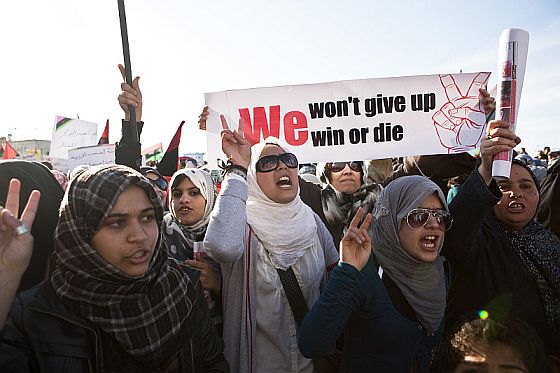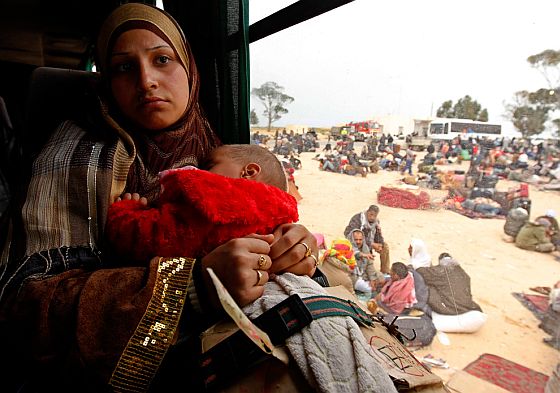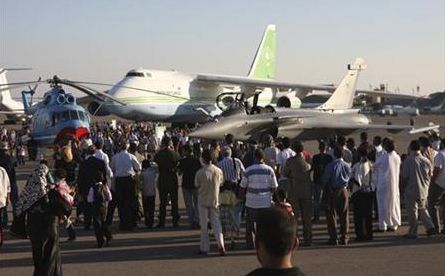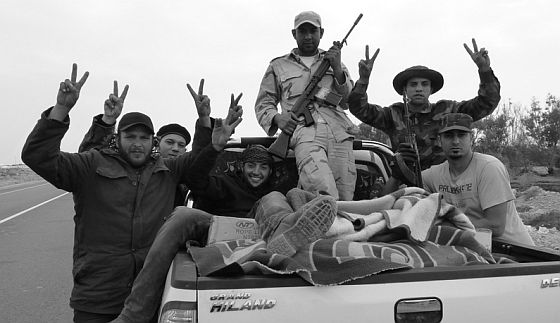Update below —
I have little doubt the Gaddafi regime pays close attention to the views being expressed by Western critics of the intervention in Libya.
One of the key lessons the Libyan leadership will have duly noted is that so long as Libyan civilians are killed 10 or 20 at a time, the war’s critics will view this as a moderate amount of killing — nothing that merits the application of the term massacre. At the same time, the message going out to Libyan civilians is that many observers in the West have less interest in who is getting killed than in who is doing the killing. Deaths that can be attributed to NATO reveal the dreadful consequences of foreign intervention, while those caused by Gaddafi are, supposedly, the unavoidable consequences of a “counter-insurgency” operation.
I guess it’s on this basis that Glenn Greenwald recommends an op-ed by University of Texas Associate Professor Alan Kuperman which is “well-argued and definitely worth reading.”
Here’s a sample of Kuperman’s reasoning:
Human Rights Watch has released data on Misurata, the next-biggest city in Libya [after Tripoli and Benghazi] and scene of protracted fighting, revealing that Moammar Khadafy is not deliberately massacring civilians but rather narrowly targeting the armed rebels who fight against his government.
Misurata’s population is roughly 400,000. In nearly two months of war, only 257 people — including combatants — have died there. Of the 949 wounded, only 22 — less than 3 percent — are women. If Khadafy were indiscriminately targeting civilians, women would comprise about half the casualties.
Women would comprise half the casualties if most of Misrata’s men thought like the satirical Larry David. (I refer to an episode of Curb Your Enthusiasm where Larry tells his wife that in the face of an imminent terrorist attack on LA, he should probably leave town and spend the weekend golfing at Pebble Beach because it wouldn’t make sense for both of them to get killed.)
Is it conceivable that the disproportionate number of male casualties has something to do with men telling their wives and children to stay indoors while they risk their lives by going out to buy the necessities their families need to survive?
It’s telling that Kuperman would selectively use statistics from a Human Rights Watch report with the title “Libya: Government Attacks in Misrata Kill Civilians” to construct an argument on how Gaddafi is not targeting civilians.
The very next paragraph after the one from which Kuperman took his numbers states:
A second doctor, interviewed separately, said that hospitals in the city had documented about 250 dead over the past month, most of them civilians. He believed the actual number was higher because many people could not reach medical facilities.
If Kuperman and other Gaddafi apologists still want to cling to the idea that the Libyan leader is showing restraint in his attempt to crush the revolution, they better not read Human Rights Watch’s latest report on the use of cluster munitions.
Government forces loyal to the Libyan leader, Muammar Gaddafi, have fired cluster munitions into residential areas in the western city of Misrata, posing a grave risk to civilians, Human Rights Watch said today.
Human Rights Watch observed at least three cluster munitions explode over the el-Shawahda neighborhood in Misrata on the night of April 14, 2011. Researchers inspected the remnants of a cluster submunition and interviewed witnesses to two other apparent cluster munition strikes.
Based on the submunition inspected by Human Rights Watch, first discovered by a reporter from The New York Times, the cluster munition is a Spanish-produced MAT-120 120mm mortar projectile, which opens in mid-air and releases 21 submunitions over a wide area. Upon exploding on contact with an object, each submunition disintegrates into high-velocity fragments to attack people and releases a slug of molten metal to penetrate armored vehicles.
“It’s appalling that Libya is using this weapon, especially in a residential area,” said Steve Goose, arms division director at Human Rights Watch. “They pose a huge risk to civilians, both during attacks because of their indiscriminate nature and afterward because of the still-dangerous unexploded duds scattered about.”
A majority of the world’s nations have comprehensively banned the use of cluster munitions through the Convention on Cluster Munitions, which became binding international law in August 2010.
I trust that those who in the past have condemned the use of cluster munitions by countries such as the United States or Israel, will likewise now, just as loudly, condemn their use in Libya.
Meanwhile, the Daily Telegraph reports on the effects of the Libyan government forces’ use of indiscriminate violence against the civilian population in Misrata:
The university professor’s eyes were red-rimmed from sleeplessness as he stood among the mourners.
“The barrage wasn’t random, it was meant to hit civilians and Nato is doing nothing to help us,” he said, to angry growls of assent from men who gathered around.
As he spoke, eight coffins carrying the latest victims of the siege of Misurata were borne past to a makeshift, playground cemetery almost within sight of where they had died. “Gaddafi is doing this to show that Nato cannot protect civilians. What is happening is a disaster, Misurata is really a disaster,” Dr Faraj Garman said.
He and hundreds of others had gathered yesterday in the port area of Ghasr Ahmad for a funeral which mixed anger, defiance and gnawing desperation.
Early prayers had not long finished and the besieged city was emerging to its daily wartime routine yesterday when the rockets fell without warning. At least thirteen were killed and 25 wounded in heavy salvoes at 6.30am and 7.30am. Between 60 and 80 Grad rockets landed among residential streets.
The worst carnage happened as residents and migrant workers joined a long bakery queue for their daily ration of bread. When the first rockets landed, many of those waiting sheltered in a garage. Moments later a rocket struck five feet from its entrance, blasting shards of steel into those huddled inside and killing six.
I guess this would be an example of what Alexander Cockburn describes as a “tsunami of breathless reports suggests that Misrata is enduring travails not far short of the siege of Leningrad in World War 2.”
Cockburn — who obviously thinks that Gaddafi has been getting a bumb rap in the Western media — says “I’d really like to see an objective account of Qaddafi’s allocation of oil revenues versus the US’s, in terms of social improvement.” Does he imagine that such an account would reveal that Gaddafi’s rule has been benign and socially enlightened?
Anyone who still believes that Libya is in the grip of a civil war should watch the following video in order to better understand what it means to be living under the control of a man who wants to brainwash his “supporters” into believing that he, his country and God are indivisible. There’s nothing benign about an authoritarian personality cult which strips children and adults of their right and capacity to express themselves.
In a civil war, vying populations are locked in a struggle over contested claims to power and territory. In Libya the Gaddafi regime has lost control over part of the population while retaining control over the remainder. But where Gaddafi retains control, he only does so by physical and psychological force.
Kudos to Al Jazeera‘s Inside Story who made a great editorial call by airing this Libyan report without additional commentary. It really does speak for itself.
(Now back to my semi-silence — this probably isn’t the best way to use cervical traction and Prednisone.)
Update: This is in response to some reader comments.
Russia and China had the power to find out what the death toll in Benghazi would have been. Either country could have cast a veto in the Security Council and stopped the intervention. If they had, the Obama administration would have probably quietly let out a sigh of relief as it was let off the hook. But neither cast a veto. Why? Because they were not willing to bear responsibility for what Gaddafi would then do, having effectively been given a green light.
It’s one thing to say, we have no way of knowing whether there would or would not have been genocidal killing take place in a scenario that never took place, but to claim certainty about what would have happened in the absence of the intervention is to make a vacuous assertion.
Moreover, it’s hypocritical to argue that the death toll in Misrata is negligible.
Louis Proyect notes:
My hometown New York City has a population of just over 8 million. That is 20 times the size of Misurata. So an equivalent casualty rate for NYC over a two-month period would be about 5000, right? And over a 12 month period would be 30,000? Now of course this would not be ”genocide” but it would be a massacre of immense proportions.
Consider that Gaza has a population of 1.6 million, just 4 times the size of Misurata. When Israel left 1500 Palestinians dead after its December 2008 invasion, the world cried out against such a bloody attack even to the point that a life-long Zionist by the name of Richard Goldstone felt enough pressure to head a commission that found Israel guilty of war crimes. But when the equivalent death toll in Misurata is nearly as high, our anti-anti-Qaddafi friends see this as a mere bagatelle.
Alan Kuperman is a Zionist who wants to see the US to bomb Iran. A month ago his main concern about Libya was that US opposition to Gaddafi would make the US look like an “untrustworthy ally.” In other words, if the US wanted to protect its international reputation then it better make sure Gaddafi stayed in power! I assume Kuperman is now deeply disturbed to see the Mubaraks thrown in jail.




